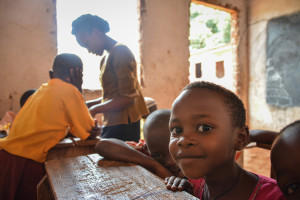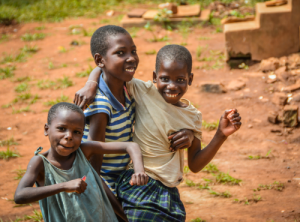Despite obstacles, Harvard Sophomores Joon Yang and Haley Baker direct orphanage and school in Uganda
After completing an internship in Paris during the summer of 2012, Joon Yang, then a high school senior, landed at Entebbe, Uganda; unbeknownst to him, this trip would change his perception of the world. Upon the recommendation of a colleague, he visited Ethical Encounters, the parent organization of a struggling orphanage and school in Nabwere, several kilometers outside Kampala. What he found was a broken organization attempting to manage both the orphanage and school under intense financial and logistical constraints. Despite the daily challenges the community faced, he was awed by their ability to persevere. Inspired by their resilience, Yang decided to take action.
Yang, now a sophomore at Harvard College concentrating in Computer Science, along with high school classmate and current Harvard sophomore, Haley Baker, studying History and Literature, founded Raise Uganda Now (RUN). Their organization manages the existing orphanage and school, formally replacing the bankrupt Ethical Encounters in August 2014. In part, Baker partnered with Yang because she felt unfulfilled at Harvard, trapped in what she called “the Cambridge Bubble.” Compelled by the photos and stories Yang brought back from Nabwere, she joined him as RUN’s co-president.

Currently, RUN serves 22 orphans and 66 local schoolchildren and employs a local staff of 17 Ugandan managers and teachers, supplemented by the occasional volunteer from overseas. At RUN’s onset, eight similarly minded students joined the staff in the US and Europe to assist in launching the organization.
Almost immediately after founding Raise Uganda Now, its two leaders faced substantial challenges. Upon inheriting the orphanage, they learned of its financial insolvency, or what Yang describes as its “decrepit state.” From August to December 2014, the organization did not intake any new funds, a fact of which Baker and Yang were not aware until October. At that point, says Yang, “we could have chosen one of two options. One was to say ‘we’re done.’” “The other option,” he continues, “was to step up to the challenge and keep the orphanage running.” Inspired by their belief in the children’s potential, and fearful of the possible consequences should they abandon the project, Baker and Yang chose to rise to the challenge.
During the last months of 2014, RUN launched an emergency campaign to pay the organization’s debt of roughly $5,000. Their fundraising strategy included soliciting funds from friends and family, and an online crowdsourcing campaign. Though RUN successfully paid its debts by early 2015, Baker and Yang still grapple with the question of how to make funding sustainable. In February, RUN obtained its 501(c)(3) certification, a move they hope will incentivize corporate sponsorship from US firms. Similarly, they are building a base of donors and grants that will support RUN in the long term.
Baker and Yang characterize RUN as rigorous in its financial accounting and documentation. They obey a model of total transparency: local employees keep each receipt for each purchase, no matter how small. Moreover, unlike many larger non-profit organizations, RUN specifically documents the financial trail of each donor dollar. Baker and Yang specifically implemented this model as an alternative to the previously unsuccessful one.
RUN’s rapid recovery would be impressive enough in its own right, but the fact that both Yang and Baker are simultaneously full-time Harvard students speaks to their inspirational level of dedication. Yang recalled the moment during the early fall when the onsite manager, Franklin Muhindo, informed him that the school’s teachers complained to the police after several months of not being paid. Amidst their studies and extracurricular activities (Yang is a staff member of Harvard Model Congress, while Baker is a varsity track and field athlete), RUN’s Cambridge staff members sprung into action, wiring emergency funds to the schoolteachers. Each day brings a unique set of challenges that require vigilant communication. Despite these hurdles, Baker and Yang recognize the gravity of their work and the significant roles they play in the lives of the orphans. “It’s a matter of life or death for them,” said Yang.

The idea that non-government organizations (NGOs) can solve the problems of economic injustice in under-resourced countries has recently come under fire. Many critics of NGO’s working in development contend that volunteer organizations have little regard for the complex fabric of the communities in which they operate and total disregard for the long-term. Furthermore, some suggest that Western volunteers, always wealthier than those they serve, create an unsustainable model of dependency whereby assistance is contingent upon donors’ whims. Baker, when asked to respond to this idea, replied: “We do have a lot of privilege here, and with that privilege comes responsibility. That responsibility is to utilize our resources and partner with people who can make something with that. We’re not blindly pouring money into this orphanage. We’re trying to build a team.”
With a confident demeanor and patient determination, Joon Yang and Haley Baker exude a spirit of optimism, both for the future of RUN and that of Nabwere. They hope to create a vocational training program to generate job security for older students in the school, build a playground at the orphanage, and provide more direct access to healthcare. What continuously motivates Baker and Yang is a combination of humanitarian compassion and the concerted hope that they can slowly chip away at the systemic injustices impoverished Ugandans encounter daily. Most of all, they are acutely aware of the need to emphasize commonalities between two seemingly opposite communities: Cambridge and Nabwere. “The community in Uganda is just as real as this one,” Yang reminded, a call to action that instills hope and inspires transformative change.
---
More information about RUN can be found here.
